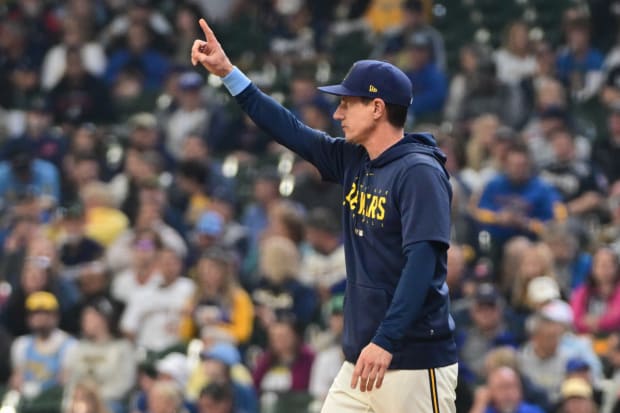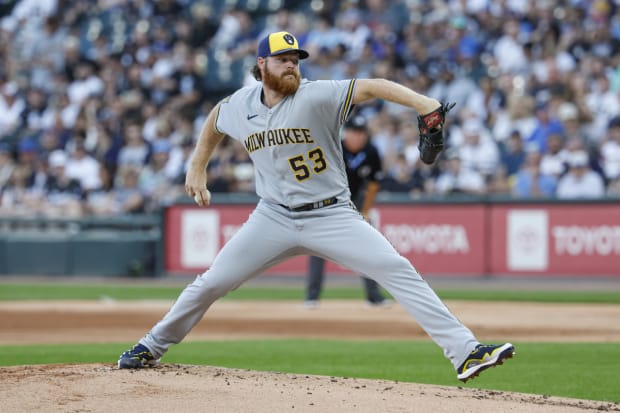If the outcome of games decided by one run is considered fickle, why do the Brewers keep winning them with regularity year after year?
If the baseball gods laugh at the randomness of who wins close games, why is their manager, Craig Counsell, the best who ever lived at cracking the code of one-run games?
And can Milwaukee, with its poor offense and razor-thin margin of error, actually keep this up and become the Braves’ worst postseason nightmare?
“It’s a risky way to play,” says Counsell, the one-run game whisperer.

Benny Sieu/USA TODAY Sports
Milwaukee was up to its usual risky tricks last week. It won three straight games by one run, boosting its record in such tight games to 24–10. Only the Marlins (27–10) have more wins and a better winning percentage in close games.
The Brewers have the third-worst offense in baseball when it comes to batting average and slugging percentage. After 119 games, they have outscored their opponents by just six runs. Their roster has flipped so much since Opening Day (12 new players) with guys who are not household names that Counsell’s own wife, Michelle, said to him recently, “I know [Christian] Yelich and [William] Contreras, but I don’t know anybody else on your team.”
And yet ... Milwaukee sits in first place in the NL Central with a 3½-game lead. This smoke-and-mirror act seems perfectly normal for Counsell’s crew.
The Brewers have won more one-run games than they’ve lost for seven straight years. Most impressively, Counsell, the longest-tenured manager in the NL, wins these close games more often than any manager ever, according to Sportradar. He passed Hall of Famer Earl Weaver on Saturday with a 3–2 squeaker over the White Sox, a game that he managed with his usual jeweler’s touch.
Best Record in One-Run Games, All Time (Min. 300 G)
| W-L | Percentage | |
|---|---|---|
Craig Counsell |
207–153 |
.575 |
Earl Weaver |
451–335 |
.574 |
Frank Chance |
281–211 |
.571 |
Harry Wright |
246–188 |
.567 |
Al Lopez |
423–328 |
.563 |
How much of that list can be attributed to managerial skill, and how much to simply having good teams? Try this exercise: Compare Counsell to Weaver when it comes to how they do in one-run games against all other games.
Managerial Win Percentage
| One-Run | Others | Difference | |
|---|---|---|---|
Craig Counsell |
.575 |
.509 |
+.067 |
Earl Weaver |
.574 |
.587 |
-.013 |
Counsell’s teams are more likely to win a one-run game than games decided by multiple runs. That’s impressive, though the man most responsible for it is hardly impressed.
“I don’t think we’re necessarily better at it than others,” Counsell says. “I don’t think we’re going to beat the odds forever on it.”
But it’s become so ingrained in how the Brewers play baseball, they just might.
“Well, it didn’t work last year,” he says.
Milwaukee was 28–23 in one-run games last year, but 1–3 in the final 10 days of the season. It missed the playoffs by one win, ending a streak of four straight postseason appearances.
What’s the deal with one-run games, anyway? Is it luck or skill that decides them? Both.
Good teams tend to win one-run games. That makes sense. But not always. The 2003 Tigers were terrible. They went 43–119. But they were a winning team in one-run games, at 19–18. But that, too, makes sense: A bad team’s best chance of winning should be when the margin is tight. Bad teams don’t win many blowouts. (The ’03 Tigers were 7–40 in games decided by five or more runs.)
The 2001 Diamondbacks represent the flip side to one-run fickleness. They had a losing record in one-run games: 23–25. They won the World Series, culminating with one of the most famous one-run wins of all time.
About 28% of all games are decided by one run. What percentage of Counsell’s career games are decided by one run? Yep, 28%. The Brewers don’t win a lot of close games because they play more of them. They win them because ... well, why not ask Counsell?
“I think it’s Devin Williams, Josh Hader, Corey Knebel, we had Jeremy Jeffress ... all those good relievers,” Counsell says. “That’s first. I think this year we’re a very good defensive team. That always helps.”
Milwaukee is an elite defensive team, largely because of an infusion of athletic rookies (Sal Frelick, Joey Wiemer, Brice Turang, etc.). It has improved from seventh in defensive runs saved to second. Combine that with a bullpen led by Williams, Elvis Peguero and Joel Payamps, and Milwaukee is not going to beat itself late when the game is on the line. Only Seattle (.189) is tougher to hit in late and close spots than Milwaukee (.200).
Surely offense must somehow factor into the Brewers’ recipe to win close games. It does, but not in a way that would bolster the argument that Milwaukee’s one-run success is due to textbook fundamental baseball. When I raise that theory to Counsell, the manager responds, “We also leave some runs out there. It cuts both ways. When you score a lot of runs, you’re going to create gaps in games.”
When you are 20th in runs scored, you tend to be in more close games than offensive powerhouses do. The Brewers already have as many wins this year by one run as did the 1927 Yankees (24) and more such wins than the ’98 Yankees (21).
Finally, the Brewers can win with this formula because their starting pitching rarely lets a game get away early. Brandon Woodruff has been dominant in two starts since coming off the IL (one walk, 14 strikeouts in 11.1 IP), providing the first look this season of Corbin Burnes, Woodruff and Freddy Peralta pitching at peak form at the same time. With the ability of Burnes (9.1 strikeouts per nine), Woodruff (10.3) and Peralta (11.0) to miss bats—and Counsell’s knack for winning close, low-scoring games—Milwaukee is a difficult postseason draw, even for Atlanta and its monster offense.

Kamil Krzaczynski/USA TODAY Sports
The Brewers’ win Saturday showcased how they and their manager wrest control of playoff-type games. Down 2–0, they scored three runs in the seventh in a rally that began with a walk and included an advance from first to third on a single, a fly ball that moved up two runners, a two-run double and a two-out tie-breaking single.
When Woodruff walked a batter with one out in the bottom of the inning, Counsell, one of the most aggressive managers in the game, jumped to put the 3–2 lead in the hands of his bullpen. Lefty Hoby Milner zipped through a pocket of four hitters (two of whom were left-handed), Peguero took care of right-handed slugger Eloy Jiménez, and Williams locked down the ninth with three strikeouts. The three relievers secured the last eight outs while allowing one single and striking out four.
Williams (7–3, 1.36), one of the most dominant relievers in the game, is striking out 38% of the batters he faces. With the way Milwaukee plays baseball, he could become the first pitcher in 21 years to win 10 games and save 30 (Billy Koch of the 2002 A’s). Fresh as ever, Williams has not allowed an earned run in his past 16 games.
Only three times this year has Counsell used Williams for more than three outs—all back in May, and each time with multiple days of rest. Now that he has brought his closer to the stretch without a heavy workload, he can deploy Williams in key games for four- or five-out saves. Such judiciousness is another Counsell trademark: His teams play better in the second half.
The next eight games are a severe test of Milwaukee’s thin margin for error. They play three straight series against first-place place teams: at the Dodgers, at the Rangers and home against Minnesota. By now, you know what to expect from this team, no matter who they play: World Cup–style baseball. They will play close, low-scoring games. And Counsell, more than anyone ever has, will find a way to win most of them.







